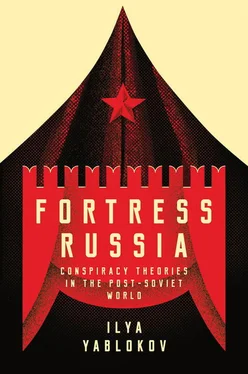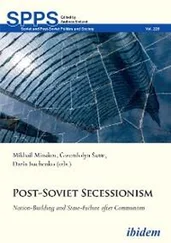Kratkii kurs VKPb ( A Short Course of the All-Union Communist Party of the Bolsheviks ), published in 1938, became the principal document outlining the ideological tenets of the Soviet regime and the reasons for the Bolshevik Party’s success. It established the juxtaposition of the USSR and the forces of ‘world imperialism’, thereby justifying the belief in conspiratorial notions and the brutal punishments meted out to political opponents (Halfin, 2001). Stalin insisted that there would be an inevitable escalation in the conflict between the Bolsheviks and the bourgeoisie as socialism developed and this explained why internal enemies in the late 1930s had become so active. Article 58 of the Criminal Law of the RSFSR, introduced in the late 1920s, treated relations with a foreign state or its representatives as a serious crime against the Soviet Union, often punishable by death (Applebaum, 2004). In addition, the term ‘agent of a foreign country’ was used in the political discourse of the Stalin era as a synonym for a ‘fifth column’, a spy ( shpion ) or a subversive element ( podryvno ielement ) (Stalin, 1997). Public trials of ‘enemies of the people’ contributed to the atmosphere of suspicion. This was all linked back to the treachery of the capitalist countries. As we will see in the following chapters, these ideas have resurfaced in a specific form in Putin’s Russia.
After the Second World War, despite the brief hopes of harmonious coexistence between the triumphant powers, the descending Iron Curtain and Stalin’s growing suspicion of the Allies sparked the Cold War and caused a new wave of aggressive conspiratorial propaganda within the country. The Marshall Plan was rejected by the Soviet Union because it was viewed as a clandestine method on the part of the USA to destroy Communism by stealth by means of the economic control which the plan would initially impose on participants. The US nuclear tests pressurized the Soviet authorities into searching for an alternative path towards post-war recovery instead of cooperation with the Allies: the resources were drawn out from within the country. This led to further isolation from the West. The Soviet Union’s plans for a rapid and independent recovery from the ravages of war resulted in a plummeting of citizens’ living standards (Zubok, 2009). To justify this, another ‘Other’ had to be created. The foreign enemy was clear: the ‘Anglo Saxon’ world led by the United States and the United Kingdom. Citizens were ready to accept this latest standoff between the Soviet Union and the West because of rumours that an invasion by Western countries was, again, a distinct possibility (Johnston, 2011).
This apparent prospect of external invasion led to renewed fear of internal subversion and led to a new wave of repression. The victims were both ordinary citizens, and elite members of Stalin’s inner circle (Gorlizki and Khlevniuk, 2004). A distinctive feature of these post-war conspiratorial witch-hunts was the focus on Jews as supposed agents of the West. From the late Stalin years, anti-Jewish and anti-Israeli conspiratorial rhetoric became a prominent part of official and informal discourse in the Soviet Union, right up to the country’s collapse in 1991 (Korey, 2004; Kostyrchenko, 2010).
In the later stages of the Cold War, the principal protagonist in anti-Soviet conspiracy was supposedly the CIA, acting with the support of spies and dissidents within the USSR (Iakovlev, 1983). The CIA embodied the crucial features of conspiracy theories, and its intrigues even played a prominent role in late Soviet popular culture. Television series such as ‘The Shield and the Sword’ (1968), ‘17 Moments of Spring’ (1973) and ‘TASS is Authorized to Announce’ (1984) made Soviet spies and intelligence officers role models for millions of young Soviet men. Fear of foreign subversion was, of course, not purely based on fiction; both the USA and the USSR were engaged in spy missions to gain access to military and political secrets with the view of destroying the other. The USA and the UK disseminated pamphlets, funded radio stations and waged propaganda campaigns to spread an alternative view of the news among the Soviet citizens and so subvert their trust in the regime.
Suspicion became part and parcel of the daily life of Soviet citizens. Living under the constant observation of neighbours and authorities in communal flats, attempting to keep secrets from them, and suspecting them of engaging in plots, served as a breeding ground for conspiratorial fears (Boym, 1994). As Ilya Utekhin has demonstrated, suspicion and paranoid assumptions about the people next door were central to the consciousness of the late Soviet citizen, and have survived the Soviet collapse (Utekhin, 2004).
The pervasive image of an internal, conspiring enemy had a deep effect on Russian national identity. In the post-war decades this identity was shaped by reference to the ‘conspiring Western rival’, and this became the ideological foundation of Russian nationalism (Brudny, 1998). Moreover, the notion of conspiracy was actively used to delegitimize political opponents, and to legitimize violence against various social groups. For example, during the Thaw era, when Khrushchev launched the de-Stalinization campaign, the modus of conspiratorial thinking was still very active and was used by Khrushchev’s opponents to oppose dramatic changes in domestic politics (Dobson, 2009). On the other hand, the political persecution of different groups and the atmosphere of fear led to a suspicion towards authority, effectively laying the foundations for anti-government conspiracy thinking (Mitrokhin, 2003).
This short overview of Russian conspiracy theories before 1991 demonstrates that the Russian conspiratorial tradition is rich and multi-faceted, and to a large extent defines the conspiratorial thinking of the post-Soviet era. The legacy of both the Imperial period and, especially, the Soviet period of Russian history is evident in the common assumption that unpopular socio-economic and political changes are the result of conspiracy. Russian messianism and the insistence on Russian greatness underlie the popularity of conspiracy theories. At the same time, the constant purges of enemies of the regime in the Stalin era, and the spy battles – both real and fictional – during the Cold War contributed to the spread of conspiracy fears among the general population. Two hundred years of conspiracy mythmaking have been decisive in shaping the notion that the West is the ultimate enemy. The emergence and proliferation of anti-Western attitudes in the post-Soviet era have, then, a solid and well-developed foundation.
2
The Spectres of Conspiracy Mythmaking
Public intellectuals play an enormous role in the development and promotion of conspiracy theories. [3]To sound convincing, conspiratorial explanation must be well-executed, and the use of numerous references and conformity to pseudo-science are both features of conspiracy theory writing (Aaronovitch, 2009, pp. 9–14). A conspiracy theorist with high social status is also able to endow his or her interpretation with a certain academic credibility.
This is certainly the case with anti-Western conspiracy discourse in Russia. As mentioned in the previous chapter, Russian intellectuals in the nineteenth century started the mass dissemination of anti-Western conspiracy theories, and in the Soviet period prominent Soviet intellectuals, as well as various factions within the Soviet government, published conspiracy tracts in popular literary magazines (Brudny, 1998; Mitrokhin, 2003). Gorbachev’s liberal reforms and the collapse of the Soviet Union created fertile ground for the dissemination of conspiracy myths, which were spread through books and political debates. The idea of the conspiring West, as articulated by national-patriotic forces, was added to the ideological arsenal of Yeltsin’s opponents, and received the support of several prominent academics, writers and public figures such as high-profile historians Anatolii Utkin and Igor’ Froianov. Through this collective intellectual effort, anti-Western conspiracy discourse was turned into one of the main lenses through which history and global politics were viewed by Russians after 1991.
Читать дальше
Конец ознакомительного отрывка
Купить книгу












